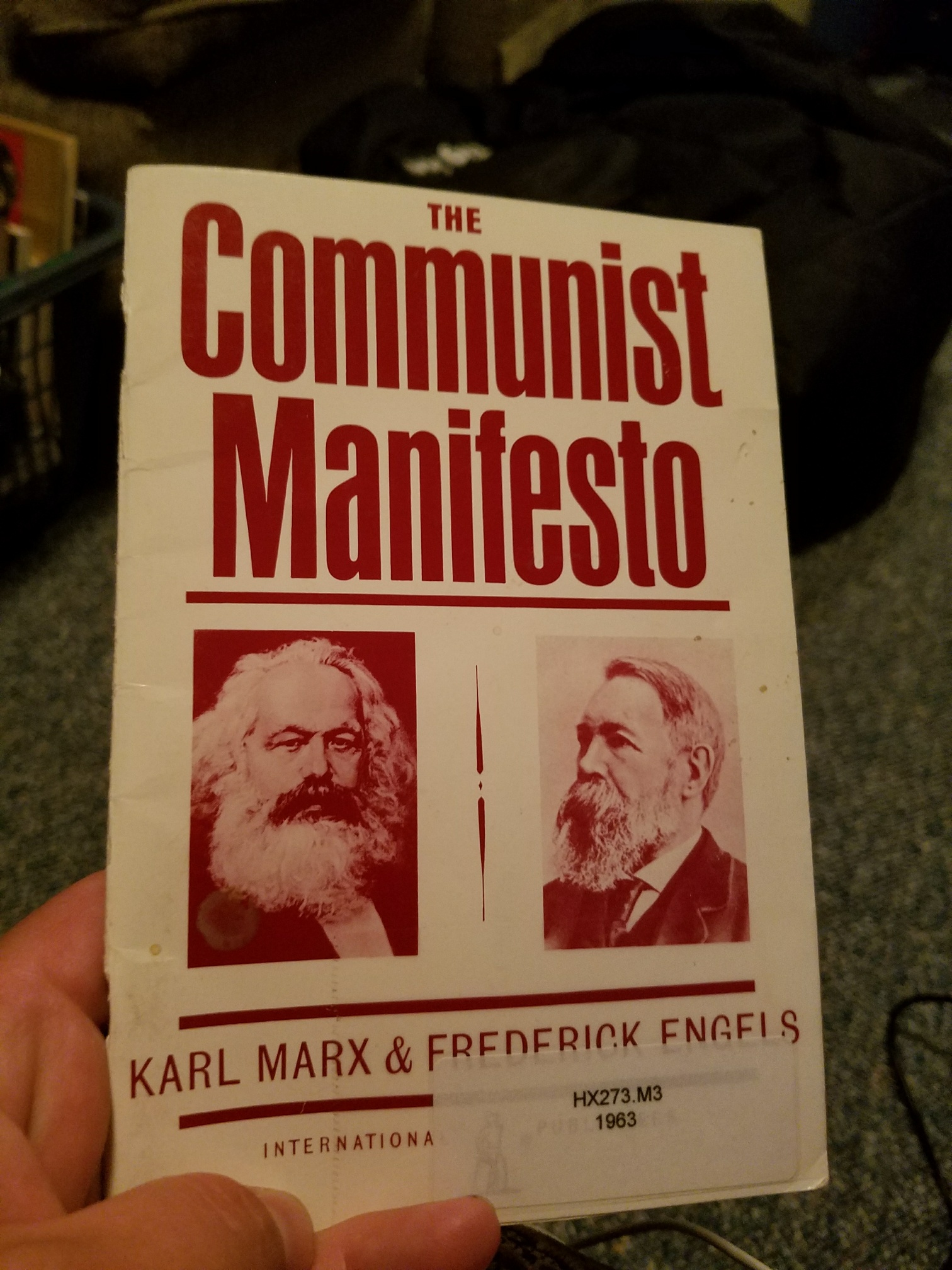 Karl Marx and Frederick Engels. The Communist Manifesto [1848]. Authorized English Translation. Translated by Samuel Moore. New York: International Publishers Co., Inc., 1948.
Karl Marx and Frederick Engels. The Communist Manifesto [1848]. Authorized English Translation. Translated by Samuel Moore. New York: International Publishers Co., Inc., 1948.
Prolegomena, or Intro stuff
This entry is a (part of a 4-5 part series) review that covers Engels’ 1888 preface to the authorized English translation of the manifesto, as well as the “preamble.” Thus begins my foray into reviewing the major works of Marxism and socialism (way down the road I will probably do this with anarchism).
In this most (in)famous of texts, The Communist Manifesto (CM), Marx and Engels lay out the program for the overthrow of the bourgeois (those who own the means of production) by the working people (proletariat). Its pace is fast, its metaphors strident. I have read the work maybe twice before, but never in so much detail as now. For example, I went so far as to number the paragraphs and summarize each in my own words. My life situation also makes this reading more memorable.
The CM text I review divides into seven sections, but four primary parts. Engels’ preface covers the reception of the CM following the revolutions of 1848. The second section, or preamble, lists communism as a bogeyman that requires definition and subsequent defense. The main argument of the book (and how the work is structured) consists of four parts: “Bourgeois and Proletarians,” “Proletarians and Communists,” “Socialist and Communist Literature,” and “Position of the Communists in Relation to the Various Existing Opposition Parties.” The final section concludes with Engels’ notes.
The Preface: The Communist League and Growing Working-Class Movement
What is now available online for free, and has been read and used by many revolutionaries since its publication, was once the agenda of a secret group called the “Communist League.” They quickly translated it from German into the major languages of Europe. However, Engels remarks on the vulnerability of the group. After the 1848 Paris revolt, and its subsequent repression, many of the League were imprisoned, until they quickly dissolved the group of their own volition.
It is common now to see the left a splintered mess: egoists, anarchists, communists, social democrats, democratic socialists, Maoists, Marxist-Leninists, Marxists, Luxemburgests, situationists, and habitual circle-jerkers. Apparently this sectarianism was present in the 1850s, too, for Engels refers to Marx’s grating success of uniting followers of Proudhon, LaSalle, and English unionists into the International Workingmen’s Association (First International).
Engels claims that the emerging working-class movement followed the translation of the CM into various languages. Though he admits the words “socialism” and “communism” could be used roughly interchangeably by 1888, they definitely could not be used synonymously in 1848. Then, socialists were those who wished to improve the welfare of people without challenging capital; communists were working class people who wanted the benefits that derived from owning capital themselves (more on Marx’s definition of “capital” in upcoming posts). Or to quote Engels: “Whatever portion of the working class had become convinced of the insufficiency of mere political revolutions, and had proclaimed the necessity of a total social change, called itself Communist” (5).
Engels is rather self-effacing when it comes to the origins of the manifesto. He attributes the nucleus of the work to Marx (though he would say they came to similar conclusions independently): social organization being invariably linked to economic production, class struggle, and proletarian emancipation from the bourgeoisie.
I find Engels’s historicizing remarks in the concluding paragraphs of his preface quite striking. He (and Marx for that matter) did not take their words as sacred scripture to be taken without criticism. For example, one of the most famous passages occurs at the end of part two, a ten-point program of sorts (from which The Black Panther Party for Self-Defense would pen its own ten-point program). Engels states that some of these aims simply don’t match the historical conditions of 1888 and so remain an artifact of 1848. He also remarks that the socialist literature reviewed in part three only goes up to 1848 and that some of the parties mentioned in part four no longer existed.
That is Engels’ preface. Now to the preamble.
Preamble: “A specter is haunting Europe–the specter of Communism.”
The Communist League saw their mere existence as a threat so severe as to elicit a unified response from parties as diverse as pope, emperors, financiers, and police-spies. The writers took this to mean that they were a power, but one which deserved a hearing of its aims and demands. It was internationalist from its beginnings. In other words, there’s was not a nationalist situation, but a union of members from England, France, Germany, Italy, Belgium, and the Netherlands. Internationalism would play a huge part in communist revolutions globally.
Concluding Thoughts
Is the CM mere antiquities, a literary piece for hobbyists? One could use it that way, I suppose, but to do so would forfeit the document’s power. Even if one does not agree with all of Marx and Engels’ assertions, they should at least give one pause. What does it mean if people are grouped into antagonistic classes? What would it mean for working people to unite as a class, overthrow bourgeois hegemony, and obtain political power (the aims of the Communist League on p. 22)? Do the revolutions of Russia, China, Cuba, Vietnam, and the various Bolivarian revolutions speak to the truth or falsehood of this document? Or how do those revolutions compare to the ideas Marx and Engels put forth?
My life situation makes this reading more poignant this time. I had written toward the end of last year a massive reading goal of 22 non-fiction works and 10 fiction works. Surely with school being done I would have nothing to do. It turned out that working 40+ hours a week in manual labor plus 10+ hours a week in commute time make for a tired and ragged Monte. It’s hard enough being a parent who is present and getting chores done; what little time I have is devoted to reading for this blog, and I don’t exactly feel great about my efforts.
I don’t know how the miners of yesteryear worked 12-16 hour days by candlelight and still made time to organize for better conditions. They are inspiring. They inspire while I feel the pressure of student debt, tired muscles, anxiety and desperation to use my mental skill, little time for my wife and children, and even less time to just read. So is the working class life. We work just to survive, while those who own capital make money off the labor of those who work. This is no a c’est la vie, or “it is what it is” statement; such is the outlook of those who share precarious conditions (like trying to find affordable healthcare), but through some obfuscation see this way of things as natural, unalterable, divinely-inspired, deserved. Recognize the power of your own activity. The way things are are not the way things have to be. Far from it.








